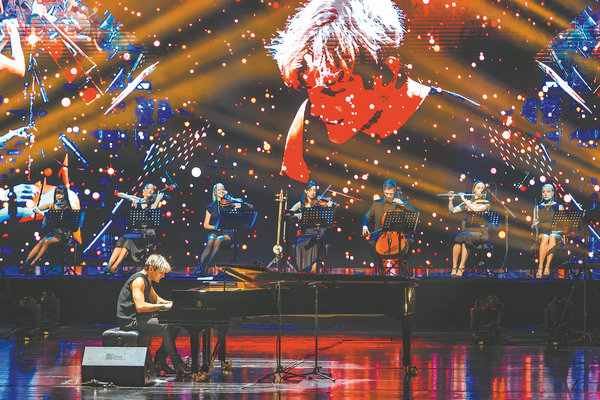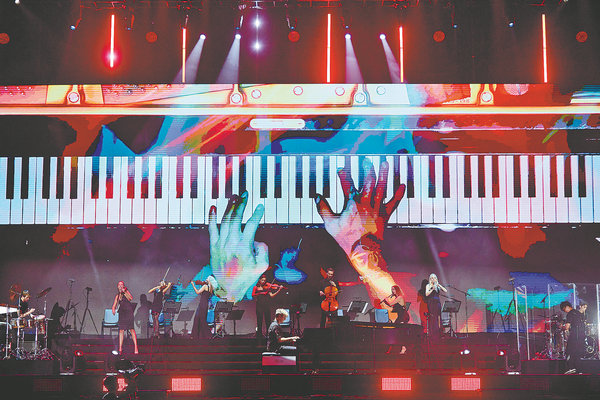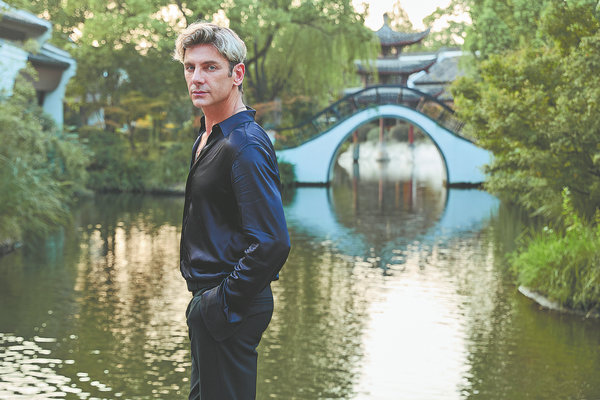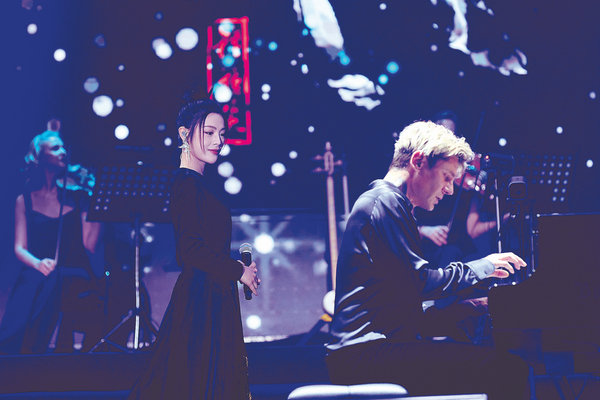Crossover musician gives new energy to traditional instrument as he launches world tour, Wang Xin reports in Shanghai.

Piano fans will probably be no stranger to the name of Maksim Mrvica, who is also known as just Maksim, a renowned Croatian pianist celebrated for his classical crossover mastery, technical virtuosity and charisma onstage.
Born in 1975 in Sibenik, Croatia, Maksim is one of the best-selling crossover pianists in the world. His albums have sold millions of copies in more than 50 countries and regions across the globe, reaching gold and platinum sales.
Often labeled as the pianist incredibly able to hit 16 notes per second, his masterpieces such as Croatian Rhapsody, Exodus, The Flight of the Bumblebee are among the best known worldwide.
Adorned with tattoos, chic hairstyles and dressed in a casual outfit with personalized decorations onstage, Maksim looks unlike a classical musician.

"I enjoy what I do. I love my job, traveling, interacting and meeting so many people around the world. I love being onstage and performing and I feel comfortable there since I was a child. If someone has an office in the building, my office is the stage all around the world," says the musician after the Segmenti world tour premiered in Hangzhou, Zhejiang province, on Oct 2.
Starting to play the piano at 9 and performing his first concert as a soloist at 11, Maksim actually had a solid education and proven achievements as a classical musician. He won his first major piano competition in Zagreb, capital of Croatia, in 1993. Later, Maksim studied at the Franz Liszt Academy of Music in Hungary. He moved to Paris in 2000 to study with Igor Lazko at the Russian Conservatory Alexander Scriabin. During his time as a student, he won first prize in a number of major piano competitions in Europe.
READ MORE: A lucky 13th for Philadelphia Orchestra
While trained as a classical pianist, Maksim is more renowned and internationally acclaimed for his crossover music that continuously explores the fusion of classical music and modern styles transcending boundaries.
"I have always wanted to experiment with the presentation of classical music, so I used lighting shows and lasers at the venue where I played the piano concerto with the orchestra. I have always had such new ideas of different presentation. Then I met my manager Mel Bush, who was back then a pioneer of crossover music and was looking for the pianist for a long time," he recalls.
ALSO READ: Chinese pianist Lang Lang performs in Geneva
That was the start of Maksim's crossover music and it has proved to be a big success. With a career catalog spanning 13 albums since 2003, Maksim has grown into one of the top-selling crossover pianists in the world.

More than five years since the last album, Maksim released his 14th album Segmenti at the end of September, announcing the start of a new classical crossover concert world tour of the same name from China a few days later.
The new album consists of eight tracks, including two covers, three originals and three classics, which showcase as always a refreshing blend of different musical segments, genres and styles, explains the artist.
Among the eight tracks is The Show Must Go On, a notable rock hit from the legendary band Queen.
"This is one of the songs which I always wanted to do. I like Queen and I did Bohemian Rhapsody before. The songs from Queen are so powerful. It was round the time of the pandemic and the end of it (when making this song), a period when the world stopped for two years. And I thought it's a perfect song to do as we need to continue with our lives," says Maksim.
READ MORE: Vienna's philharmonic triumph
Although different from the original version, Maksim's covers are never about making them easier to play. In addition to the piano as the main instrument, he usually infuses the songs with rich symphonic sounds from the orchestra, as well as difficult and complex arrangement and techniques to interpret the themes with no less power.
Maksim is crossing his own boundaries too, with the challenging classical piece Prokofiev Fantasy presented on the album.
"It is one of the most technically complex and difficult pieces I ever had to record for my crossover albums. It comes in three parts, including the famous Romeo and Juliet Ballet and the coda from the Prokofiev's Piano Concerto No 3. This concerto is one of my favorites since I was a child. I've heard it a million times, and I want to keep the coda as it is, without changing any note. It's so difficult and complex, literally, to play 20 pages in one minute. I was laughing to myself when learning it, but it was so much joy and fun in the end," he says, laughing.
The original track Glorietta on the album, written by Croatian composer Tonci Huljic, is highlighted for its traditional Asian instruments and Oriental melodies, such as the pipa (a four-stringed Chinese lute) and Chinese bamboo flute.
READ MORE: Dunhuang destined to dazzle onstage
This is not the first time that Maksim and Huljic absorbed Chinese and oriental elements into their creation. In his last album released in 2018, they made a majestic piece named New Silk Road, which integrated musical elements from China, Russia, India and Central Europe, and is well-received by Asian audiences.
Jake Zeng, a trade manager in Hangzhou, spoke highly of such elements.
"My favorite piece used to be the Croatian Rhapsody, but later, I like New Silk Road more. In his previous albums, he made the arrangements more on Western classical pieces. So the Chinese elements in New Silk Road are refreshing, and we as Chinese people are more connected and excited about such arrangements," says Zeng after the Segmenti world tour premiere in the city.

This world tour premiered in Hangzhou only a few months after the end of his two-year The Collection world tour, during which he presented more than 100 shows in 22 countries and regions on four continents. Basically, he has been crossing geographic boundaries as well.
Asked about how to keep in good condition for an energetic and passionate two-hour concert each time in tight schedules, he says it is all about "love" and the audiences' appreciation always fuels him up.
"For me, it's always interesting to come to the country where I've never been, and to introduce myself to the audiences for the first time. It is so rewarding for me as an artist to see the audiences' reaction, enthusiasm and excitement when they listen to my music," he says with a smile.
ALSO READ: Commissioned music creates cultural bonds
Maksim first came to China 21 years ago, winning an MTV music award in the country, which kicked off his journey here. Since then, he has visited China with extensive concerts and shows across the nation, nurturing a large crowd of fans at all ages.
Maksim says he was always impressed by Chinese culture and the Chinese audiences for their enthusiasm.
"As soon as I come onstage at the beginning of the show, I have huge ovations (from Chinese audiences).This is something that exists only when they really know you, and are happy to be here. For me, to begin the concert like that is amazing. It's like a huge push for the general energy of the concert," he says.
As a professional pianist for about four decades, Maksim is still actively open for explorations and challenges in music. Over the past two decades, he has been on many shows and collaborated with quite a few Chinese musicians, including Chinese cellist Ouyang Nana, guzheng (Chinese zither) player Zhao Jienan and erhu (a two-stringed Chinese fiddle) player Chen Yimiao.
ALSO READ: A symphony for all seasons
"I always consider myself lucky because I was born with this talent and the love for the instrument and classical music. I can't physically be without the piano for a long time. It is part of my life and part of who I am. Music can be very powerful in terms of touching your life and moments. Many people might underestimate the power of music, but it is a very powerful element in life," says Maksim.
The Segmenti classical crossover world tour is continuing to hit several cities across China within this year, including Fuzhou, Shenzhen, Guangdong, Kunming, Chengdu, Nanjing, Qingdao, Changchun and Shanghai.


